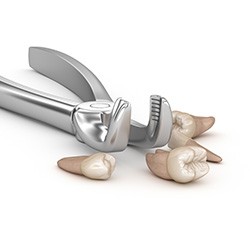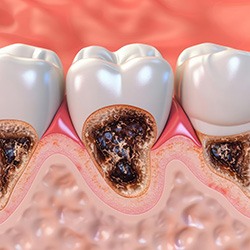Tooth Extractions – Wellesley, MA
Compassionate Tooth Removal

At Wellesley Dental Group, our team always strives to help patients keep their natural teeth. However, that is not possible in all cases. If circumstances give rise to the need for one or more tooth extractions, you can be confident that we will perform the procedure with compassion and top-level skills. Continue reading below to learn more about tooth extractions, and then give us a call if you would like further information about this restorative service.
Why Choose Wellesley Dental Group for Tooth Extractions?
- Experienced & Compassionate Dental Team
- Able to Perform Wisdom Tooth Extractions
- Sedation Available for Nervous Patients
Reasons Why Tooth Extractions Are Necessary

We may determine that one or more tooth extractions are necessary if:
- A tooth is so severely decayed or damaged that attempting to repair it would be impractical or even impossible.
- We need to create more space in your mouth for dentures or orthodontia.
- A child’s baby tooth needs to be removed so the adult teeth can develop properly.
- A tooth is impacted (stuck beneath the gumline).
- A tooth is badly infected, and removing it is the best way to prevent the infection from spreading into nearby tissues.
- The wisdom teeth are causing pain or are threatening your future oral health.
The Process of Removing a Tooth

We start by making you comfortable. Not only will we numb your mouth, but, depending on circumstances, we may administer sedation as well.
Once you are settled in, we can use an instrument called an elevator to lift the tooth out of its socket. Then, we grip it with forceps and rock it in order to break the connective tissues holding it in place. Once the tooth is out, we clean the socket and place some gauze to control bleeding.
If a tooth is impacted, we may need to take additional steps. For example, we might have to make incisions in the gums or break the tooth into pieces.
Tooth Extraction Aftercare

You can minimize your discomfort and lower your chances of post-op complications by applying these simple tips:
- Take medications, such as antibiotics or painkillers, as recommended by our team.
- After the first 24 hours, start regularly rinsing your mouth with warm salt water.
- Do not smoke.
- Do not use drinking straws.
- Eat a soft diet.
- Get plenty of rest.
- Avoid vigorous physical activity.
- Keep your head propped up on pillows when you are sleeping.
You should also attend all recommended follow-ups with our team. We may need to explore your tooth replacement options so you can reduce your risk of further tooth loss in the future. Tooth replacement can also support the aesthetics of your smile and help you to maintain a healthy bite.
Understanding the Cost of Tooth Extractions

Simple extractions tend to be one of the most affordable restorative dentistry services. However, because every case and every patient is unique, the cost of this service can vary quite a bit. When you come in for a consultation, we can share some specific numbers with you and explain your financial options. Our team welcomes insurance, and most patients qualify for low-interest financing.
Factors That Can Affect Tooth Extraction Cost

The cost of tooth extractions can be affected by:
- The specific tooth that needs to be removed. Due to their location and other circumstances, some teeth are more challenging to extract than others. Therefore, they incur higher fees.
- The number of teeth being extracted. Logically, we must charge higher fees for multiple extractions as opposed to single tooth extractions.
- The overall complexity of your case. In some cases, surgical extraction (rather than simple extraction) is necessary. This process is more complex and leads to higher costs.
- Who performs your procedure. We can handle most extractions right here in our office. If we ever have to refer you to an outside specialist, you can expect them to have a different pricing structure.
- Additional care. Sedation during your procedure, as well as tooth replacement afterward, can have a significant impact on the total cost of your care. You might be a candidate for multiple types of sedation/tooth replacement, which can come at very different price points.
Does Dental Insurance Cover Tooth Extractions?

It is very common for dental insurance to cover tooth extractions. In most cases, simple extractions are categorized as a basic service, so up to 80% of their cost may be covered. Surgical extractions are a major service and are often 50% covered. Our team welcomes insurance, and we are in-network with many popular plans. We will be happy to help you understand how your benefits may apply in any given situation.
Other Options for Making Tooth Extractions Affordable

We do not want you to be overly stressed about paying for your care, so we offer additional provisions that might help you afford your extraction procedure:
- We work with third-party lenders, including CareCredit and Sunbit, to provide low-interest payment plans. Applying is easy, and most patients are quickly approved for an affordable monthly plan.
- Essential Dental plan. Designed for patients without insurance, this discount plan provides reduced fees on most of the services performed in our office. It takes just a few minutes to sign up.
Are you interested in learning more about tooth extractions and their cost? Our Wellesley team will be happy to answer your questions. Get in touch with our office today.
Tooth Extraction FAQs
Does Getting a Tooth Extracted Hurt?
Our team wants you to be as comfortable as possible during procedures, so you can expect us to administer plenty of local anesthetic for your tooth extraction. We also offer multiple sedation options. With the help of these provisions, you can expect to feel little to no discomfort during your appointment.
After the sedation and anesthesia wear off, you can expect some soreness, swelling, and general discomfort. A soft diet, pain medication, and rest can help to minimize your pain. Most people are feeling fairly normal within a few days to a week of their procedure.
If you experience any severe or unusual pain, contact us right away so we can assist you.
Is There an Alternative to a Tooth Extraction?
We typically only recommend tooth extractions if there are no other viable options.
In some cases, a damaged tooth can be restored via root canal therapy, a crown, or other procedures. However, if the damage is extensive, it might be impossible or impractical to try to salvage the tooth. In such cases, extraction may be the only suitable treatment.
In order to avoid extractions, we strongly advise you to be proactive about your oral health. A good oral hygiene routine, paired with regular visits to our office, can do much to help you maintain your natural teeth throughout your lifetime.
What Is the Difference Between Tooth Extractions and Wisdom Tooth Surgery?
Wisdom tooth surgery is a specific type of tooth extraction. It is exclusively for the third molars at the back of the mouth.
In some cases, wisdom tooth extractions are similar to normal extractions. In other cases, though, it becomes a surgical procedure. We might need to make incisions in your gum tissue, break the teeth into pieces, or use other means to successfully remove them.
Can I Leave the Space Empty After a Tooth Extraction?
After the removal of your wisdom teeth or supernumerary (extra) teeth, there is no need to be concerned about tooth replacement.
In almost all other circumstances, tooth replacement is very important. If you fail to replace lost teeth in a timely manner, you may face a number of complications, such as:
- Deterioration of your jawbone
- Dental drift (your remaining teeth may shift out of place)
- Additional tooth loss
- Difficulty chewing
Our team can talk to you about your tooth replacement options even before your natural teeth are removed. You should spend as little time as possible without an incomplete smile.
